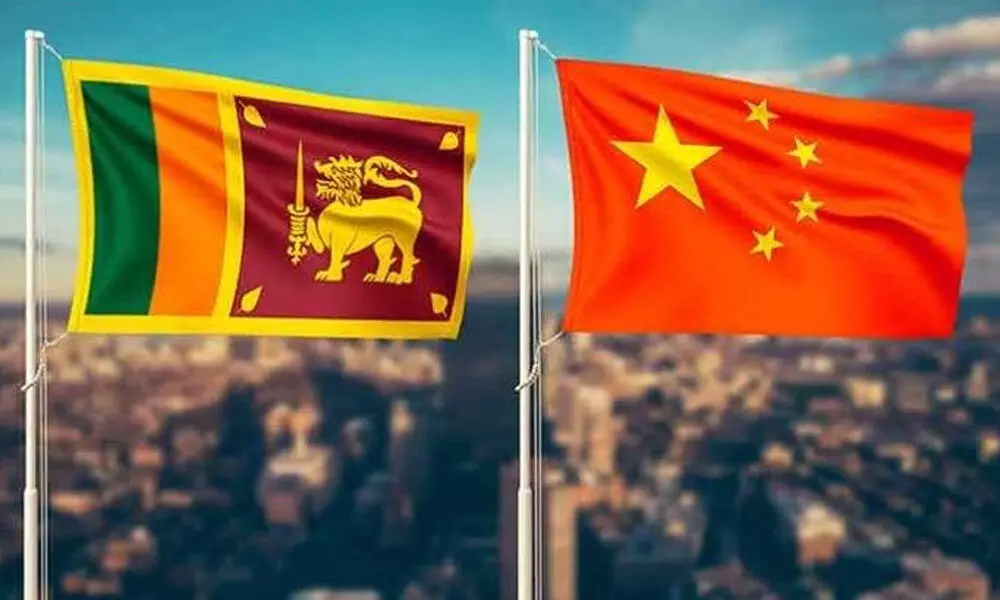Is Lanka stuck in Dragon's clutches?
After 2011, China had also been influencing Sri Lanka’s foreign policy decisions, having established a firm grip over the government through the bourgeoning debt traps
image for illustrative purpose

For some South Asian countries like Sri Lanka, Myanmar and Bangladesh, the 'China Nightmare' is no longer just a bad dream. It is a living reality, which continues to threaten the countries' national interests, and eat away at their very sovereignty.
Sri Lanka's fall into the dragon's trap was triggered when China, taking advantage of the souring relations between Colombo and the Washington, started its aggressive courting of the Mahenda Rajapaksa government from the time he assumed office in 2005.
By 2007, the war against the LTTE was raging, and the island nation was facing increasing international criticism over human rights issues.
The US significantly reduced its foreign assistance package, and neighbour India's assistance was constrained by the Tamil sentiments back home.
The dragon, which was closely watching, swooped in with a $37 million deal for Chinese ammunition and ordnance.
This was followed in 2008 by the gift of six F7 fighters, JY-11 radar and anti-aircraft guns. By the time the war with the LTTE ended in 2009, relations with China were upgraded to a 'strategic cooperative partnership'.
However, the deadliest move made by China in its strategic game was made in 2007 itself, when it got Rajapaksa to lease land at Hambantota for construction of a port at a cost of $1 billion.
By 2014, Chinese aid and loans to Sri Lanka had exceeded a staggering $6 billion, which included the Colombo Port City Project (CPCP), the South Container Terminal at Colombo Port, an Exclusive Investment Zone 35 miles from Colombo port, and a railway project. The net had been cast. It now remained for China to commence reeling it in.
President Xi Jinping, in his September 2014 visit to Sri Lanka, did just that, and an agreement for Chinese companies to operate the by now bleeding Hambantota port was signed.
Having snared its prey under a debt trap, Beijing then commenced leveraging its might into arm-twisting Colombo to get CCP Navy submarines to dock at Sri Lankan ports during their deployment to the Indian Ocean. These submarines, which are accompanied by submarine rescue ships, have been entering the region more frequently in the recent past, and find Sri Lanka to be a convenient port of call. What is interesting to note here is that Sri Lanka is the only country in the Indian Ocean besides Pakistan, where these submarines have entered during their deployment over the last seven years.
China's shadow has also loomed large over Sri Lanka's politics and elections.
After 2011, China had also been influencing Sri Lanka's foreign policy decisions, having established a firm grip over the government through the bourgeoning debt traps.
With Sri Lankan debts to China in excess of $8 billion, the room for manoeuvre for the government of the day was already quite limited. And of course, Chinese diplomacy has always been very nimble to adjust its front to changing dynamics.
In the aftermath of the 2015 elections, China commenced courting not only the political parties, but also prominent Buddhist clergy in the island nation. This development was through the realisation of the influence of these religious figures in Sri Lankan domestic politics. Certain other factors threaten to push Sri Lanka deeper into the dragon's trap. Last year, the IMF prematurely ended the $1.5 billion loan programme to the island nation. This was accompanied with the Covid pandemic, which delivered a terrible blow to Sri Lanka's tourism industry.
This 'double whammy' ended any thoughts that Sri Lanka may have been nurturing of salvaging its situation against China.
In March this year, Sri Lanka announced a $1.5 billion currency swap with the Chinese Central Bank. It also declared its partnership with China in developing two irrigation reservoirs in the Sinharaja Reserve Forest, which is a UNESCO-protected heritage site.
In June 21, China Harbor Engineering Company (CHEC) bagged a project for construction of a 17-km elevated highway in Colombo, the terms of which provide full ownership to the company for revenue and profits for 18 years.
This is the same CHEC, which is a subsidiary of the China Communications Construction Company (CCCC) that is leading the Hambantota Port Project, Mattala International Airport and the $1.1 billion Colombo Port City.
For the 2015 elections, payments totalling to $1.1 million were linked from CHEC to Rajapaksa's election campaign supporters. Today, the situation is grim to the extent that the Chinese squeeze is resulting in Sri Lanka backing off from deals with other countries.

